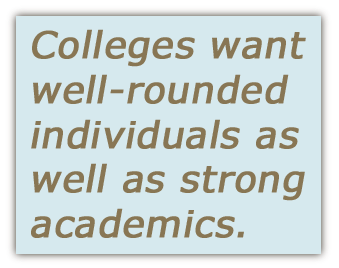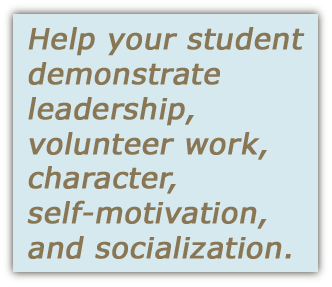Preparation Beyond Academics
Published on September 30, 2025 by homescholar

BOOK EXCERPT from Lee Binz book The HomeScholar Guide To College Admission and Scholarships”:
The HomeScholar Guide to College Admission and Scholarships: Homeschool
Secrets to Getting Ready, Getting In, and Getting Paid
CHAPTER 4
“I have become all things to all people so that by all possible means
I might save some.”
1 Corinthians 9:22
“What are our assets?”
Westley, preparing to storm the castle
~ The Princess Bride
Preparing for college involves more than equipping our children with a
strong academic background. Colleges also want students who are
well-rounded. Not just well-rounded in their rigorous curriculum,
although that is important, but also well-rounded as individuals. Why do
colleges care?
Colleges are businesses. They make an investment in your student when
they award admission and financial aid. It is an investment in the
future. They believe these students will be the movers and shakers in
society, and will in due time shine a bright light back on the
university from where they came. As they make their decisions, they
consider some key questions: “Will they succeed and make the college
proud?” “Will they go on to leadership positions in society?” And most
importantly, “Will they ultimately earn enough money to leave an
endowment?”
These questions play a significant, if perhaps subconscious role in
admissions decisions. Clearly, colleges want to admit students who
appear to be well-rounded and show potential for success. Demonstrated
experience in such areas as leadership, volunteer work, and employment
all contribute to a student’s development as an individual, as well as
the development of character, self-motivation, and socialization. These
attributes will help the colleges see that your student is someone
worthy of admission!
LEADERSHIP

Colleges want to see leadership demonstrated in a student’s life.
Leadership experience may come through Boy Scouts, 4-H, youth groups,
sports, or teaching others piano, guitar, or chess. Leadership comes
from passion, experience, and a desire to share interests with others.
In other words, to be a leader, one must first want to be a leader.
When dealing with college applications, it is pretty easy for
extroverted teens to highlight leadership. Identifying leadership in the
quiet teen is a bit more of a challenge. The quiet ones may not
recognize their leadership at all. In such cases, you may need to gently
point it out to them. But whether or not they see it in themselves, it
is often recognized by outsiders. By the time our youngest applied for
college, he had amassed quite an impressive resume of leadership
positions. But our oldest demonstrated his areas of quiet leadership by
teaching classes to others, and during the full-tuition scholarship
competition, he also came away with the big prize.
VOLUNTEER WORK
Colleges love to see students who give to the community, and students
will also benefit from volunteer work. Encourage your children to
volunteer for community service. This could be through a faith-based
organization, in your local community, through a sports league, or just
within your own neighborhood. The possibilities are endless. One way to
find a good fit for your children is to encourage them to volunteer in
their area of passion. Are they excited about gardening? Maybe they
could volunteer with the local gardening club. Do they enjoy building
model rockets? Perhaps they can volunteer with a local science camp and
help others learn all about it. Whatever your child does that is helping
others can count towards volunteering.

EMPLOYMENT
Students also become well-rounded through employment experiences,
including internships and apprenticeships. Colleges will be impressed by
students who demonstrate the skills needed to be employable, and your
students will also benefit from work experience. Internships are a very
popular option for homeschoolers to “test drive” a vocation or
profession. Whether these are paid or unpaid internships, they can be
valuable, if only for the insights they provide. Students who
successfully complete an internship may even eventually land a full time
position at the same company. But even if they don’t, internships can
yield some valuable letters of recommendation used for college
admissions. Finally, apprenticeships are a wonderful way for students to
get some work experience. These opportunities often grow out of the
passionate interests that develop as students reach the teen years, and
begin to discover more about themselves. All of these employment
experiences will show the colleges that your student has what it takes
to succeed in the real world.
SOCIALIZATION
Homeschoolers have the advantage in socialization, since they spend
their childhood socializing across a broad spectrum of ages, classes and
cultures. They are not limited to narrow socialization, segregated by
age and status common in a typical American high school. Consequently,
when they are called on to interact with adults in the college admission
process, they often feel right at home.
Socialization was, in fact, the deciding character feature when my boys
brought home two full-tuition scholarships. Every applicant invited to
the full-day scholarship competition had great grades and test scores.
The college admissions staff told us that they were looking at social
skills as the deciding criteria. How well did these young scholars
interact with one another, with the faculty, and with the staff on
campus when they thought no one was looking? This seems so ironic when a
common question about homeschooling is, “What about socialization?” My
homeschoolers took two of the ten scholarships awarded, based on
socialization! Socialization is important to colleges, so make sure you
demonstrate your student’s accomplishments in this area!
CHARACTER

Closely related to socialization is character. Colleges want to admit
students with strong character who will go on to reflect well on their
alma mater. How well have your family values been absorbed by your kids?
Growth in character development is directly correlated to time spent
with your kids. The “quality time” is not nearly as important as “face
time.” Face time can be accrued by the bushel load when you are teaching
your kids for hours a day at home, shaping and molding their character
day by day. The reason you don’t hear about the negative effects of peer
pressure in homeschool families is that the “peers” are typically
siblings who are all being nurtured by the same loving set of parents.
In college admissions, character may come through best in the
application essays. Encourage your teens to write about experiences that
highlight their character. Brainstorm with them on the ways that they
have given themselves away to others during their childhood and
adolescence. Did they come with you when you volunteered at church or in
the community? If so, what did they learn? Did they ever visit shut-ins
with you? How did that affect them? Character is one of those traits
that is caught rather than taught, so make sure your students can convey
these experiences in their application essays.
SELF-MOTIVATION
Self-motivation is one of my favorite attributes, because of the
delightful serendipity involved. Busy with my household chores, I was
unwilling to re-educate myself on higher-level high school math and
science. After a while, it became clear that my children had to become
self-motivated and learn higher-level math and science on their own,
since my husband and I felt incapable of teaching it.

And they did learn it. With the right curriculum and video tutorials, my
boys basically taught themselves calculus and physics. The results were
twofold. First, they learned how to be self-taught. Second, they
experienced the satisfaction associated with doing it independently.
When you encourage self-reliance and self-teaching, you are doing your
teen a favor that will pay dividends when they go to college.
Ironically, a favorite expression university professors use with their
freshman students is, “I am not your parent.” This is supposed to
underscore the point that no one will be nagging the students to
complete their work. If your student already knows how to learn on their
own, they will start college with a tremendous advantage over their
spoon-fed peers.
IMPERFECTION
Can you really have it all? No! Although it is important to be
well-rounded, please remember that nobody has it all. When you fill out
college applications, it becomes clear that your student may excel in
one thing and not another. Don’t despair. My students had great
SAT®
scores, but they only had tiny amounts of volunteer work. They were
employed and involved in sports, so there was hardly any time for
community service. My son would occasionally play his piano at nursing
homes or at church, but volunteer work was really not our area of
strength. Nobody has it all. If your students are strong in some areas,
but not so strong in others, that’s okay. It just means they are human!
FACING FAILURE

When you complete a college application, one of the things they ask for
is a list of “activities and awards.” In addition to being a way for you
to help your kids stand out from the crowd, there is another, little
appreciated aspect of this exercise: what you record is entirely up to
you! The activity and awards list is only for successes, and failures
don’t go on the list!
• Worked at a fabulous job? On the list!
~ 28 job interviews followed by rejection? NOT on the list!
• Awarded $200 in scholarship money by the community? On the list
~ Applied to 10 big-money scholarships, but rejected by each one? NOT on
the list
• Member of the wrestling team? On the list
~ Never actually won a match? NOT on the list!
As homeschool parents, the failures of our children and ourselves are
always right in front of our eyes. Our failures may look huge and
discouraging. Failure is negative feedback, telling us what we do NOT do
well, and an encouragement to keep trying. But in the face of failure,
remember that we also have some success. Only things our children do
well are put on the activity and awards lists. Don’t list the bad
things, just the good things! Remember to write down those wonderful
activities and awards when they happen so you won’t forget anything. You
don’t want to be facing the application form and suddenly draw a blank.
EXECUTIVE SUMMARY FOR BUSY PARENTS
Prepare for College and Life
• Colleges want more than academics.
• Leadership, community service, and employment are important.
• Social skills, character, and self-motivation are valuable.
• Nobody has everything, no homeschooler is perfect.
• Failures do not go on the activity list.

